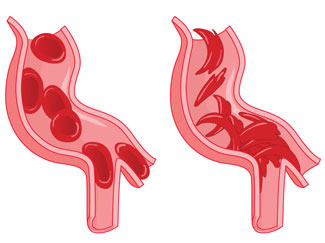
Sickle Cell Disease DNA Test
Find out whether you carry genetic changes in the HBB gene which cause sickle cell disease
Find out if you are at risk - get tested
| Test Type | Testing Time | Fee |
All orders received before 3pm PST / 6pm EST are shipped out the same business day. All orders received after 3pm PST / 6pm EST or on weekends or holidays are shipped out the following business day. 24/7 online status check and account management available for all tests.
About the Sickle Cell Disease (Hemoglobin S, C and E Genotyping) Test
The hemoglobin C, E and S genotyping test will determine if an individual has any mutations in their HBB gene that result in the production of the abnormal hemoglobins – HbS, HbC and HbE.
What is the HBB gene?
The HBB gene encodes the β-globin component of hemoglobin. Normal adult hemoglobin (HbA) is composed of two α-globin chains and two β-globin chains. The HBB gene is located on Chromosome 11. We inherit one copy of HBB from each parent.
Genetic Changes in HBB
There are various defective forms of HBB that cause different disorders including sickled cells and beta thalassemia. The three most common mutations that cause sickle cell disorders are c.20A>T for HbS, c.19G>A for HbC and c.79G>A for HbE. The sickle cell genetic test determines whether or not an individual carries each of these mutations.
Test Specifications
Age Limit None. This test can be taken at any age.
Collection Method Buccal swabs. The test kit contains buccal swabs and instructions for collecting a buccal swab sample from inside the mouth.
Specimen Requirements Four buccal swabs, rubbed inside the mouth against the cheek for 15 seconds.
Testing Time 1 – 2 weeks.
Alleles Tested Genetic mutations in the HBB gene: c.20A>T, c.19G>A, c.79G>A
Testing Methodology Laboratory specimens are analyzed using sequence-based typing to detect the presence of three HBB alleles. Analytical specificity and sensitivity for detection of these alleles are >99%. Other alleles not listed are not detected.
Sample Handling DNA test kits do not have an expiry date and can be used at any time. Once the DNA sample is collected, it must be returned to the laboratory for testing within three months of collection. No refrigeration is required. Store at room temperature.
Limitations of the Test This test will only look at these three common mutations in HBB that result in the production of HbS, HbC and HbE. There are other rare mutations associated with sickle cell disorders (and other blood disorders) that are not tested in this assay. The results of this assay should be interpreted in conjunction with symptoms, clinical findings and medical and family history.
